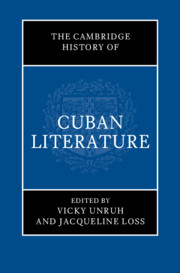Book contents
- The Cambridge History of Cuban Literature
- The Cambridge History of Cuban Literature
- Copyright page
- Dedication
- Contents
- Figures
- Contributors
- Acknowledgments
- Introduction Unfinished Histories
- Part I Literature in the Early Colony
- Part II Cuban Literature’s Long Nineteenth Century
- Part III Literary and Intellectual Culture in the Twentieth-Century Republic
- Part IV The Revolution’s Literary-Cultural Initiatives and Their Early Discontents
- 22 Beginnings
- 23 Imagining Cuba’s New Revolutionary Communities Through Film (1959–1989)
- 24 Shaping New Cultural Literacies
- 25 The Social Life of Music in Cuban Literary Culture
- 26 Casa de las Américas and Revolutionary Configurations of Latinoamericanismo
- 27 The Travels of Fiction in the Cuban Diaspora
- 28 Cuba’s Poetic Imaginary (1959–1989)
- 29 The Artistic Worlds of Guillermo Cabrera Infante
- 30 The Diasporic Odysseys of Reinaldo Arenas and His Writings
- Part V Cuba and Its Diasporas into the New Millennium
- Epilogue
- Select Bibliography
- Index
- References
27 - The Travels of Fiction in the Cuban Diaspora
from Part IV - The Revolution’s Literary-Cultural Initiatives and Their Early Discontents
Published online by Cambridge University Press: aN Invalid Date NaN
- The Cambridge History of Cuban Literature
- The Cambridge History of Cuban Literature
- Copyright page
- Dedication
- Contents
- Figures
- Contributors
- Acknowledgments
- Introduction Unfinished Histories
- Part I Literature in the Early Colony
- Part II Cuban Literature’s Long Nineteenth Century
- Part III Literary and Intellectual Culture in the Twentieth-Century Republic
- Part IV The Revolution’s Literary-Cultural Initiatives and Their Early Discontents
- 22 Beginnings
- 23 Imagining Cuba’s New Revolutionary Communities Through Film (1959–1989)
- 24 Shaping New Cultural Literacies
- 25 The Social Life of Music in Cuban Literary Culture
- 26 Casa de las Américas and Revolutionary Configurations of Latinoamericanismo
- 27 The Travels of Fiction in the Cuban Diaspora
- 28 Cuba’s Poetic Imaginary (1959–1989)
- 29 The Artistic Worlds of Guillermo Cabrera Infante
- 30 The Diasporic Odysseys of Reinaldo Arenas and His Writings
- Part V Cuba and Its Diasporas into the New Millennium
- Epilogue
- Select Bibliography
- Index
- References
Summary
This chapter investigates the tensions between the so-called cosmopolitan and national realms in works of several writers who departed the island at various points after Cuba’s 1959 revolution, spending much of their subsequent lives in the diaspora in Mexico, Spain, Paris, or the US. Some of these writers had impactful careers in Cuban publications and institutions prior to their departure. Through close readings of the fiction of Nivaria Tejera, Julieta Campos, Severo Sarduy, Antonio Benítez Rojo, Jesús Díaz, and Eliseo Alberto, the chapter unpacks the heterogenous travelers’ gazes and experiences that frame Cuban history, literature, and identity at the end of the twentieth and the beginning of the twenty-first centuries.
Keywords
- Type
- Chapter
- Information
- The Cambridge History of Cuban Literature , pp. 424 - 437Publisher: Cambridge University PressPrint publication year: 2024



